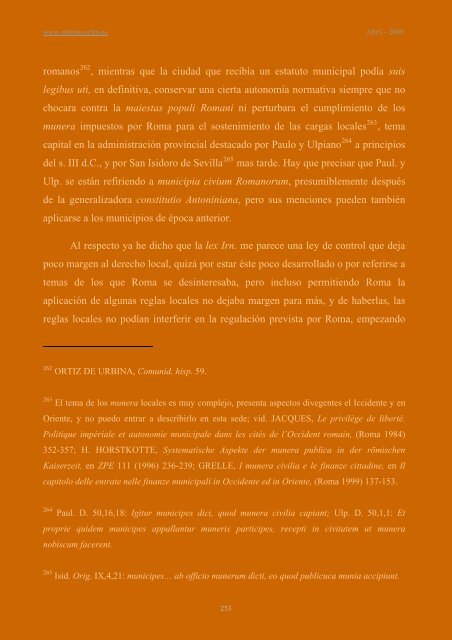ius latii and lex irnitana - revista internacional de derecho romano ...
ius latii and lex irnitana - revista internacional de derecho romano ...
ius latii and lex irnitana - revista internacional de derecho romano ...
You also want an ePaper? Increase the reach of your titles
YUMPU automatically turns print PDFs into web optimized ePapers that Google loves.
www.ridrom.uclm.es Abril - 2009<br />
<strong>romano</strong>s 262 , mientras que la ciudad que recibía un estatuto municipal podía suis<br />
legibus uti, en <strong>de</strong>finitiva, conservar una cierta autonomía normativa siempre que no<br />
chocara contra la maiestas populi Romani ni perturbara el cumplimiento <strong>de</strong> los<br />
munera impuestos por Roma para el sostenimiento <strong>de</strong> las cargas locales 263 , tema<br />
capital en la administración provincial <strong>de</strong>stacado por Paulo y Ulpiano 264 a principios<br />
<strong>de</strong>l s. III d.C., y por San Isidoro <strong>de</strong> Sevilla 265 mas tar<strong>de</strong>. Hay que precisar que Paul. y<br />
Ulp. se están refiriendo a municipia civium Romanorum, presumiblemente <strong>de</strong>spués<br />
<strong>de</strong> la generalizadora constitutio Antoniniana, pero sus menciones pue<strong>de</strong>n también<br />
aplicarse a los municipios <strong>de</strong> época anterior.<br />
Al respecto ya he dicho que la <strong>lex</strong> Irn. me parece una ley <strong>de</strong> control que <strong>de</strong>ja<br />
poco margen al <strong>de</strong>recho local, quizá por estar éste poco <strong>de</strong>sarrollado o por referirse a<br />
temas <strong>de</strong> los que Roma se <strong>de</strong>sinteresaba, pero incluso permitiendo Roma la<br />
aplicación <strong>de</strong> algunas reglas locales no <strong>de</strong>jaba margen para más, y <strong>de</strong> haberlas, las<br />
reglas locales no podían interferir en la regulación p<strong>revista</strong> por Roma, empez<strong>and</strong>o<br />
262 ORTIZ DE URBINA, Comunid. hisp. 59.<br />
263 El tema <strong>de</strong> los munera locales es muy complejo, presenta aspectos divegentes el Icci<strong>de</strong>nte y en<br />
Oriente, y no puedo entrar a <strong>de</strong>scribirlo en esta se<strong>de</strong>; vid. JACQUES, Le privilège <strong>de</strong> liberté.<br />
Politique impériale et autonomie municipale dans les cités <strong>de</strong> l’Occi<strong>de</strong>nt romain, (Roma 1984)<br />
352-357; H. HORSTKOTTE, Systematische Aspekte <strong>de</strong>r munera publica in <strong>de</strong>r römischen<br />
Kaiserzeit, en ZPE 111 (1996) 236-239; GRELLE, I munera civilia e le finanze cittadine, en Il<br />
capitolo <strong>de</strong>lle entrate nelle finanze municipali in Occi<strong>de</strong>nte ed in Oriente, (Roma 1999) 137-153.<br />
264 Paul. D. 50,16,18: Igitur municipes dici, quod munera civilia capiant; Ulp. D. 50,1,1: Et<br />
proprie qui<strong>de</strong>m municipes appallantur muneris participes, recepti in civitatem ut munera<br />
nobiscum facerent.<br />
265 Isid. Orig. IX,4,21: municipes… ab officio munerum dicti, eo quod publicuca munia accipiunt.<br />
253

















